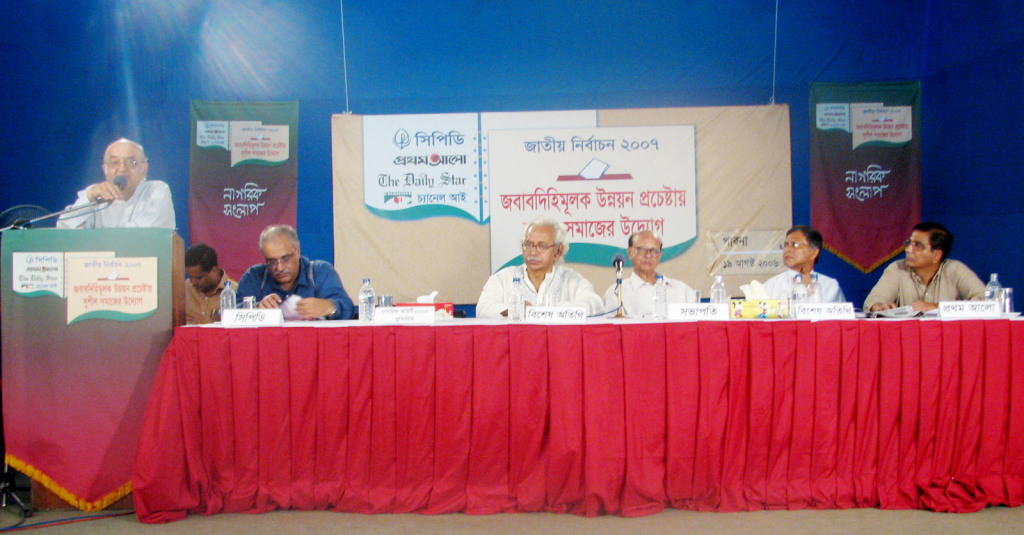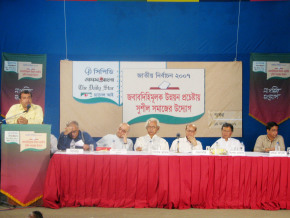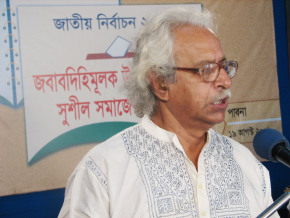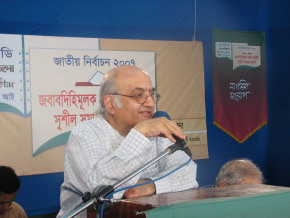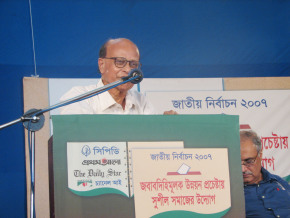Speakers at the regional dialogue at Pabna (August 19, 2006) emphasised direct election in seats reserved for women, selection of candidates through secret vote of local leaders and workers and bringing reforms in the Election Commission and political parties.
If the national level leaders are honest, the grass roots leaders would automatically be honest, they said.
They underscored the need for an emergency meeting of the major political parties for holding a free and fair election in 2007 which is ‘very crucial’ for implementation of vision 2021.
The speakers also demanded turning the Pabna Edward College into a full-fledged university, resumption of production in closed mills and factories, creation of job opportunities for the youths and protection of land from erosion of Padma and Jamuna rivers.
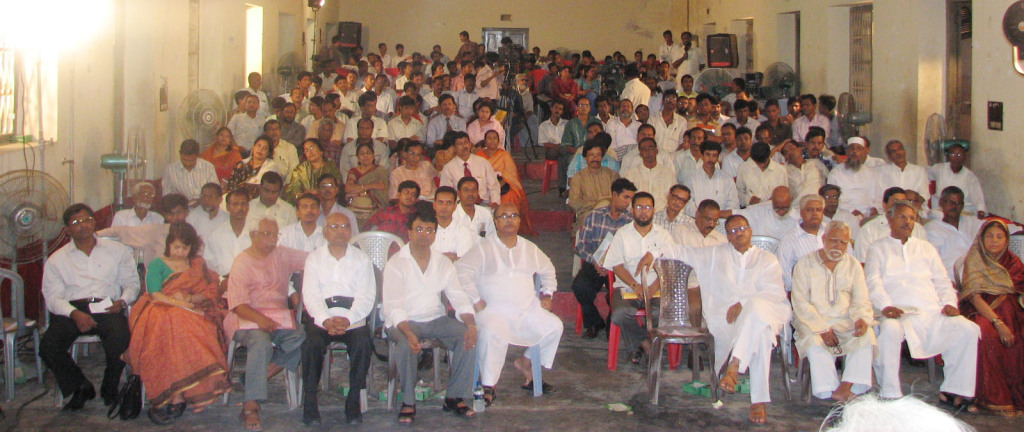
Centre for Policy Dialogue (CPD) organised the dialogue in joint collaboration with The Daily Star, the Prothom Alo and Channel i. It was part of a series of discussions arranged by the civil society initiative for campaign for honest and competent candidates in the election 2007 and ensuring accountable development in the country.
CPD Executive Director Debapriya Bhattacharya conducted the dialogue at Bandhan Community Centre in the town. AR Shamsul Islam, former principal of Government Mohila College, Pabna, presided over the discussion while Abdul Kader, executive director of development organisation Somota, and advocate Ronesh Moitra were special guests.
Chairman of CPD and convener of Nagorik Committee 2006, Prof Rehman Sobhan, and editor of the Prothom Alo Motiur Rahman also spoke on the occasion.
Describing the prevailing political situation, the speakers expressed doubt about the fate of next general election.
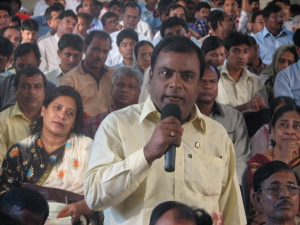 Somota Executive Director Abdul Kader demanded two kinds of accountability from the politicians — one at the local level and another at the national level.
Somota Executive Director Abdul Kader demanded two kinds of accountability from the politicians — one at the local level and another at the national level.
Opening of the closed mills and factories in Pabna, creation of more job opportunities for the unemployed people and protection of land from river erosion are people’s demand, he said, adding that at the national level, people want policy and programme for reaching the resources to the poor.
Along with increase in the number of poor people, the number of drug addicts is also going up, Kader said.
He expressed concern over the increase of landless people in Pabna district due to erosion by Padma and Jamuna rivers.
Urging the political parties to be united under a separate platform and formulate a vision for developing the country, advocate Ronesh Moitra said, “A separate platform is necessary on the question of common objectives as the evil forces are getting organised regularly.”
He called upon the people to launch a mass movement like that in 1969, against the misrule and corruption.
To explore the country’s immense potential of growth, direct road and rail link with India should be established, Moitra said.
Although the gas supply through pipeline reached Pabna, it is not being supplied to mills and factories, he said.
He called upon the civil society to create pressure on the government to stop mismanagement, corruption and terrorism.
Moitra also criticised the government for price hike of the essential items and deteriorating law and order situation.
In his presidential speech, AR Shamsul Islam made some recommendations for free and fair elections — system of negative vote on ballot paper, rapid liquidation of election cases, acceleration of strategy for poverty alleviation, separation of religion from politics and ensuring honesty of the candidates.
He said the election in 2007 is very significant for implementation of Vision 2021.
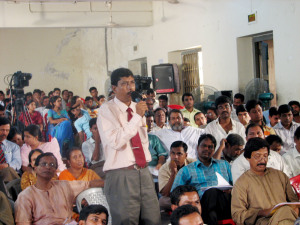 Competent candidates were not elected in the previous elections, he said, adding that the candidates take the advantage of voters’ poverty. Besides, they are also being given training on election engineering, he added.
Competent candidates were not elected in the previous elections, he said, adding that the candidates take the advantage of voters’ poverty. Besides, they are also being given training on election engineering, he added.
Prof Rehman Sobhan, chairman of the Centre for Policy Dialogue and convener of Nagorik Committee 2006, said the poor people should get some benefit of the democracy that cannot be fruitful without poverty alleviation.
If an honest and competent person gets nomination people should support him, he said, adding that people should also keep watch on their representatives after an election.
The people have been divided into two groups — the elite and general mass, Prof Sobhan said.
He said the government should think how the khas land can be distributed among the landless.
Motiur Rahman said the ruling coalition has become desperate to cling to power while the opposition is also hopeful about their victory but neither of them accepts defeat after the election.
The ruling party controls everything and the opposition regularly boycotts parliament, he said, adding that such a situation makes the fate of next elections uncertain.
Former member of parliament advocate Amjad Hossain demanded that candidates should not be allowed to contest in the next general elections if they had failed to fulfil the promises made during the previous elections.
He also expressed his doubts whether the next general election scheduled in 2007 will be held at all.
To check the influence of black money in polls, Anwarul Haq, a local journalist, proposed to impose a ban on the election rallies by the political parties adding that the candidates will address from a single platform arranged by the Election Commission.
Haque also demanded cancellation of the provision allowing tax-free import of cars by the members of parliament.
Mahbubul Alam Mukul, president of Pabna Chamber of Commerce, demanded immediate supply of gas to the BSCIC industrial area, alleging that though gas supply reached Pabna through pipeline a few years back, the mills and factories are yet to be benefited from it.
Agriculturalist Jafar Sadique sees immense potentiality of growth in agriculture sector. By applying appropriate technology, a total of 10 crore ton crops could be produced on 17 lakh hectares of land annually, he said.
Opposing participation of businessmen in the elections, he said if they (businessmen) want to contest, they should come through Federation of Bangladesh Chamber of Commerce and Industry (FBCCI).
Advocate Shamsul Haque Tuku, general secretary of Pabna District Awami League (AL), observed that fanaticism, terrorism and corruption are the main features of the country these days. He called upon the civil society to come forward for ensuring a free and fair election.
Mohammad Azizul Haque, principal of Pabna Law College, criticised the unilateral administration system controlled from Dhaka and stressed the need for a change.
Describing the administration in the district town as poor, Haq said people even cannot file complaints with the police station. The local administration has no accountability, he added.
M A Kafi Saker proposed an emergency meeting of all major political parties for holding a free and fair election.
Ilias Iftekhar Rasul, an eye specialist, observed that the election would not be fair if the Election Commission does not set an expenditure limit for the campaigns. He also said that the presence of democratic practice with the political parties was of the worth of almost zero.
The political parties have hardly any influence on people as degradation of the parties’ morality continues. He said changes only in the Election Commission would not ensure fair general elections.
Prof Nurunnabi, former principal of Government Shaheed Bulbul College, Pabna, said Bangladesh is not a failed state. “A government can fail but a state cannot,” he added. Nurunnabi said the civil society has great contribution to a number of major achievements of the country.
Gopal Sanyal of Drama Circle observed the caretaker government system was the by-product of a political rivalry and lack of confidence between political parties. He said the Election Commission is working like a puppet and the political parties have turned into business companies.
Baby Islam, president of Pabna Diabetic Society, said, “Honest and competent election candidates are hard to find. Those who opposed the independence of the country are now making their moves with the national flag in their hands.” He said people can say nothing as everything is controlled from Dhaka, even though this is a democratic country.
Doctor Sarwar Jahan said people should monitor the activities of the lawmakers after the election and the civil society can play an active role in this regard.
Former member of parliament Zannatul Ferdous, President of Pabna District Bar Association Mohammad Abdul Matin Miah, Zakir Hossain of Workers Party, Municipality Commissioner Shamima Shirin, Masud Rana Mohammad Shamsuzzman, Dr Amin Ahmed Khan, Rokeya Ahmed, Rabeya Khatun, Roisuddin, Saiful Islam, Habibur Rahman Shawpon, Kazi Rafiqul Alam, Vashkor Chowdhury, Gonesh Das, SM Alauddin Paragh, KM Ataur Rahman Rana, Mohammad Shamsuzzoha, Quamrun Nahar Joly, Purabi Moitra also participated in the discussion.


